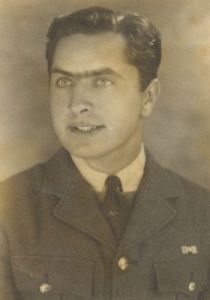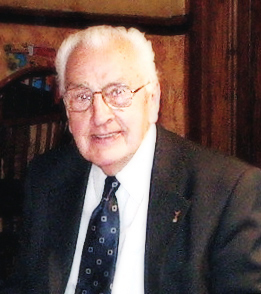A Desert War Diary
Author John (Jack) Walton
(born 15/08/1919 died 30/01/2008)
Joined the RAF in 1937 as an Airframe Fitter but retrained in 1939 as an armourer and was posted to 213 Squadron until 1945
.
John, aged 20 who had been an airframe fitter since entry into the RAF in 1937 retrained as an armourer when he left England on Thursday 22nd May 1941 aboard the troopship Georgic in the company of other convoy ships Arrander, Duchess of Bedford, Flying Duchess, Windsor Castle, Strathmore and Stratheden. Escorted by HMS Hood, (Battle cruiser, sunk on24th during the famous engagement with the German Battleship Bismark))HMS Exeter, HMS Kosic, HMS Zulu, (Destroyers)
HMS Argus and HMS Furious ( Aircraft Carriers)
To avoid U Boats and enemy aircraft the convoy’s direction was changed regularly rather than a direct route to their destination. Little did John know that it was to take almost three months? With the sheer number of Airmen, Soldiers and Sailors aboard the troopship the sleeping arrangements were less than basic. The lucky ones may find a mattress; the less lucky a hammock, the unlucky would have to sleep on the floor and hope not to get stepped on. They were packed into any space, below the waterline and the noise of the waves hitting the hull, as John explains, was quite disconcerting to the non sailors amongst them.
Two days later “boat stations” alarm sounded and every one put on their life jackets. The cause of the alarm was an approaching German bomber (JU88). Some aircraft launched from HMS Exeter and managed to shoot the bomber down much to the cheers and relief of all.
By Wednesday 28th May they had been joined by other ships and were now over 200 assorted troopships. The biggest personnel convoy of the war, heading for the Middle East. Such a convoy would almost certainly have been communicated to German intelligence. For this reason, using the narrow straights of Gibraltar was considered far too dangerous and therefore their journey would have to be made around the horn of Africa. John’s entry mentions that they had just heard of the battle between the Royal Navy and Bismark. At the time it was considered that the Bismark was heading for their convoy.
1st June the convoy is attacked by two German bombers. Two ships were hit but not seriously. Apparently there were also a few German U boats, circling the convoy, but the warship screen was effectively discouraging any attack with depth charges.
6th June provided a brief respite to the reluctant “sailors” as the Georgic and others stopped to replenish water and supplies but there was to be no shore leave as the convoy were soon off again and out into the Atlantic heading down to the Gulf of Guinea. U Boats were a serious threat and evasive sailing was the order of the day “Boat Station” alarms must have abraded the nerves by their constant sounding. This state of nervous anxiety continued night and day for the next 11 days as the convoy continued with its zig zag course to evade any lurking U Boats.
Friday June 19th the convoy is rounding the Cape and good news for John and his mates. The ship will be calling into Durban. After three weeks at sea, under constant threat of attack from torpedo or bomb, they will be allowed to go ashore. They arrived the next day but shore leave was not given to everyone. John had to wait until Saturday 21st before he finally put foot on dry land.
By the following Friday they were once again steaming out the Indian Ocean but at least the sea was much calmer than the Atlantic. A fact John appreciated having missed a few meals through sea sickness. A short stop in Aden for a couple of hours then off again into the Red Sea. With still 1000 or so miles to go the convoy now is in range of the German Airforce flying from their desert bases. As the Georgic was the largest troop ship in the convoy it was fairly accepted that the enemy would try to sink her at the first opportunity so life for everyone on board must have been very stressful. Just how close to attack they were was soon to be very apparent.
By Tuesday 8th July John and his mates had finally reached their destination, Port Tewfick. Here they are transported a short way in land where they take up residence in tents whilst all their stores and equipment are unloaded. The next stage will be overland to Kasafret. The stores were brought from the ship by lorry and on the Thursday John heard from one of the drivers that the Georgic had been attacked by bombers sustaining considerable damage and loss of life.
Whilst waiting for the Squadron to be reformed at their tented village they were under constant air attack from the Italian bombers so trenches had to be dug for air raid protection. If the air raids were not enough, the oppressive heat during the day, freezing cold of night, sandstorms and the ever present sand flies, mosquitoes and scorpions certainly made life very difficult. Still they waited for their aircraft to arrive.
By 20th July the squadron was beginning to come together, C flight was attached to 73 Squadron at Sid Hanaish and the rest of the Squadron were involved with convoy patrols. Just when it seemed 213 Squadron were settled they were all then moved to Lydda, Palestine to take part in the Syrian campaign. Finally, on the 3rd of August the entire Squadron was assembled at Landing Ground 90. John’s hopes that they will now settle down to be a proper working squadron were dashed less than a week later when the CO informed everyone to get their kitbags together, pack up and off to Port Said. Here they board a destroyer, HMS Abdiel, destination Cyprus.
Back at sea, the repetitive zig zag course to deter enemy submarines begins once again making sleep almost impossible. Two days later, at 2 am they are awakened by speakers and told to disembark. A short walk from the ship and they are herded onto an old train that John describes as something seen at a fairground. A three hour train journey follows, finally ending at 5 am at a wadi near Nicosia. Here the guys are allowed to sleep the rest of the day. The next morning, working in a makeshift armoury John gets to do the job he has been trained for, stripping, cleaning and maintaining the Hurricane machine guns. The work goes on until 10 o clock PM as the aircraft will be flying the next morning. Despite the long hours it is good to be doing his job and it is a vast improvement to conditions in the desert. Life was hard work but the pleasant weather and beautiful surroundings of Cyprus made for a good life.
As the months moved on the airbase started to come under increasing attack as the enemy started to make moves to invade the island. The weather had started to cool quite considerably and by December it was understood that they would soon have to be on the move again. The Squadron aircraft were already operating with other Squadrons around Lebanon. John is “chosen” to be part of the advance party that will be flown ahead to get things organised for the rest of the Squadron’s arrival.
December 2Oth the advance party are loaded onto DC3’s and they take off for Lydda airdrome. A fighter escort was provided but in view of the range could only accompany the four Dakotas half way, after that they were on their own. 22 hours later all four aircraft arrived safe and sound and unmolested. However, considering what was ahead of him, John may well have considered the flight, unescorted, without parachutes, actually the best part of the trip. Lydda was merely a staging post. Once more crammed onto a tiny Victorian era train was the start of 5 day journey of over 1000 miles to Cairo arriving December 25th, Christmas day. Then onto Lorries to another transit camp at Abu Qir.
Abu Qir was an oasis in more ways than the traditional word. Here, for the first since leaving Cyprus the lads could take their boots and uniforms off, enjoy a proper bath with lots of hot water and soap, be fed a wonderful supper and go to sleep in a real bed with clean sheets. Must have felt like heaven.


John Walton was an armourer with 213 Squadron. Just one of many young men forming part of the unsung ground crews whose job it was to keep the Squadron’s aircraft maintained and ready for action. In peacetime it was a job that involved long hours and hard work. A task made a hundred times harder, in the middle of a desert and in the middle of a war. For John and all his comrades’ squadron life was a world far removed from the cinematic portrayal of the glamorous “Fighter Pilot” but every pilot relies on the skill, dedication and professionalism of the ground crew to send him into combat in an aircraft that performs as it should and will get him safely home again.
John’s diary entries give the reader an insight into the thoughts, fears, traumas and triumphs of just one of thousands of young men who served in Cyprus and the desert campaign. John kindly gave his permission to produce an overview of his book which is available from Woodfield Publishing.
Click on the book to link To Woodfield Publishing
It is with much regret and sadness that I was unable to complete this dedication page to one of the unsung ground crew, that pilots owed so much to, before John could see it. Likewise to his son Alan, my sincerest apologies for the delay. I recommend this little book as a must read for anyone remotely interested in the WW2 RAF desert campaign and have included a link to Woodfield Publishers should you wish to order your own copy. Sadly John Walton passed away in January 2008. When speaking of the Pilots of the RAF and the Battle of Britain the term "One of the few" comes readily to mind but, without young men like John, working in for the most part, hellish conditions,in every theatre of war, the pilots would have had little to fly in and precious little to shoot with. So, although Johns book, A Desert War Diary, is about the experiences of one man I like to think it can be read as a dedication to all the unsung hero's keeping the aircraft airworthy, armed and fueled. I have included a link to part of Johns church service written by his son. Alan.
I think John was a quiet, private man who served his country as best he could every day. I would like to think he would have approved of my efforts. Likewise to Alan and his family, I hope you can forgive the delay and also approve of this page to your Dad........... Brian ( Webmaster )
